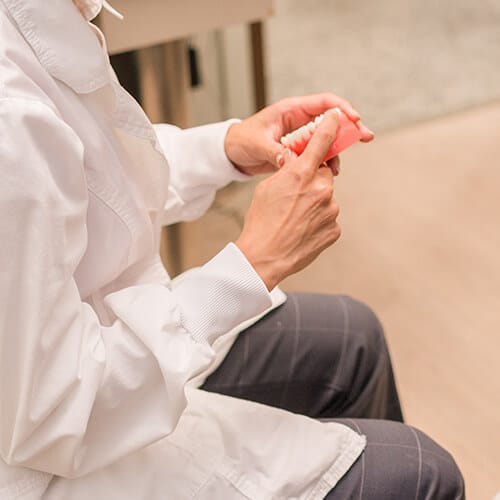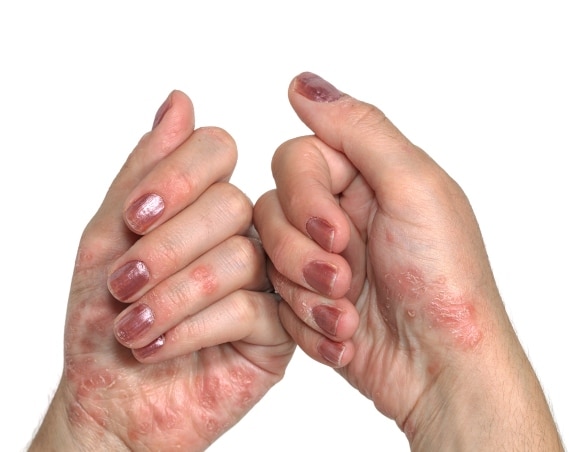Understanding Psoriasis
Psoriasis is a chronic autoimmune disease that primarily affects the skin. However, it can also impact other parts of the body, including your mouth. If you have psoriasis, it’s important to understand how this condition might affect your oral health.
5 Different Types of Psoriasis
- Plaque Psoriasis: When most people hear the term, they usually think of this type. It is characterized by scaly patches of skin that can often be itchy and may even crack and bleed.
- Guttate: Shows as small round lesions that usually appear during childhood and may even be triggered by a strep infection, which are common among children.
- Inverse: This is often found in combination with other types of the disease. These shiny lesions are usually seen in skin folds such as: behind the knees, in the underarms, etc.
- Pustular: This form presents like white pustules that may look like an infection but is not. The pustules are filled with white blood cells as a result of the immune response. This type usually is reflected in the hands and feet.
- Erythrodermic: Often found in individuals with uncontrolled plaque. This form is rare and is particularly severe. It is seen as an extremely itchy, painful, redness all over the body that can cause the skin to peel. This form can be life-threatening. If it starts to appear, you should see a doctor immediately.
How Psoriasis Can Affect Your Mouth
Oral Psoriasis
Sometimes, psoriasis can appear in the mouth. This is known as oral psoriasis. Lesions or red patches may form on your gums, tongue, or inner cheeks. These lesions can cause discomfort, sensitivity, or even pain.
Gum Inflammation
Psoriasis may also contribute to gum inflammation. People with psoriasis may be more prone to gingivitis or periodontitis. These conditions can lead to swollen, red, and bleeding gums. Therefore, good oral hygiene and regular dental visits are especially important.
Increased Risk of Infection
Because psoriasis can weaken your immune system, you may be more susceptible to oral infections. These infections may include fungal infections, such as oral thrush, or bacterial infections. Being proactive about oral care can help prevent such issues.
Dry Mouth
Some medications used to treat psoriasis can cause dry mouth. Saliva helps protect your teeth from decay and gum disease. Thus, dry mouth can increase your risk of dental problems. Staying hydrated and using saliva substitutes can help manage this issue.

Tips for Managing Psoriasis and Protecting Your Oral Health
Practice Excellent Oral Hygiene
Brush your teeth twice a day and floss daily to remove plaque and bacteria. Using a soft-bristled toothbrush and fluoride toothpaste is recommended.
Visit Your Dentist Regularly
Schedule regular dental check-ups and cleanings. Your dentist can monitor your oral health, detect any problems early, and provide appropriate treatment. Let your dentist know you have psoriasis, so they can tailor your care accordingly.
Stay Hydrated
Drink plenty of water throughout the day to keep your mouth moist. This is especially important if you experience dry mouth due to psoriasis medications.
Avoid Irritants
Avoid using tobacco products, as they can worsen psoriasis and harm your oral health. Limit your intake of sugary and acidic foods and drinks, as they can contribute to tooth decay and gum problems.
Manage Stress
Stress can trigger psoriasis flare-ups. Find healthy ways to manage stress, such as exercise, meditation, or hobbies you enjoy.

Why Choose Our Seattle Dental Office?
At Innovative Dentistry, we understand the connection between psoriasis and oral health. Our experienced team is dedicated to providing personalized care to meet your unique needs. We are here to help you manage your oral health and maintain a healthy smile.

Schedule Your Dental Appointment Today
If you have psoriasis, taking care of your oral health is essential. Contact us at Innovative Dentistry to schedule a comprehensive dental exam. Contact us or call (206) 622-2999. We are committed to helping you achieve and maintain a healthy smile. To learn more about our team and services, visit our about page or services page.
References
Colgate: https://www.colgate.com/en-us/oral-health/conditions/immune-disorders/how-to-treat-your-psoriasis-mouth-symptoms-0715
National Psoriasis Foundation: https://www.psoriasis.org/advance/gum-disease-more-likely-in-people-with-psoriasis
NCBI: https://www.ncbi.nlm.nih.gov/pmc/articles/PMC4280688/
Mayo Clinic: https://www.mayoclinic.org/diseases-conditions/psoriasis/symptoms-causes/syc-20355840
